-
 Bitcoin
Bitcoin $117500
2.15% -
 Ethereum
Ethereum $3911
6.19% -
 XRP
XRP $3.316
10.79% -
 Tether USDt
Tether USDt $1.000
0.01% -
 BNB
BNB $787.2
2.24% -
 Solana
Solana $175.2
4.15% -
 USDC
USDC $0.9999
0.00% -
 Dogecoin
Dogecoin $0.2225
8.40% -
 TRON
TRON $0.3383
0.28% -
 Cardano
Cardano $0.7868
6.02% -
 Stellar
Stellar $0.4382
9.34% -
 Hyperliquid
Hyperliquid $40.92
7.56% -
 Sui
Sui $3.764
7.63% -
 Chainlink
Chainlink $18.48
10.66% -
 Bitcoin Cash
Bitcoin Cash $582.1
1.88% -
 Hedera
Hedera $0.2601
6.30% -
 Avalanche
Avalanche $23.33
4.94% -
 Ethena USDe
Ethena USDe $1.001
0.02% -
 Litecoin
Litecoin $122.3
2.04% -
 UNUS SED LEO
UNUS SED LEO $8.969
-0.27% -
 Toncoin
Toncoin $3.339
0.86% -
 Shiba Inu
Shiba Inu $0.00001287
4.30% -
 Uniswap
Uniswap $10.43
7.38% -
 Polkadot
Polkadot $3.861
5.08% -
 Dai
Dai $1.000
0.02% -
 Bitget Token
Bitget Token $4.513
3.41% -
 Monero
Monero $267.7
-6.18% -
 Cronos
Cronos $0.1499
4.14% -
 Pepe
Pepe $0.00001110
5.15% -
 Aave
Aave $284.9
8.28%
Are the income from pledge mining affected by market volatility?
Staking rewards' cryptocurrency amounts aren't directly tied to market price, but their value is. Network activity influences reward rates, while provider reputation is crucial to mitigate volatility risks and scams.
Mar 06, 2025 at 05:36 am
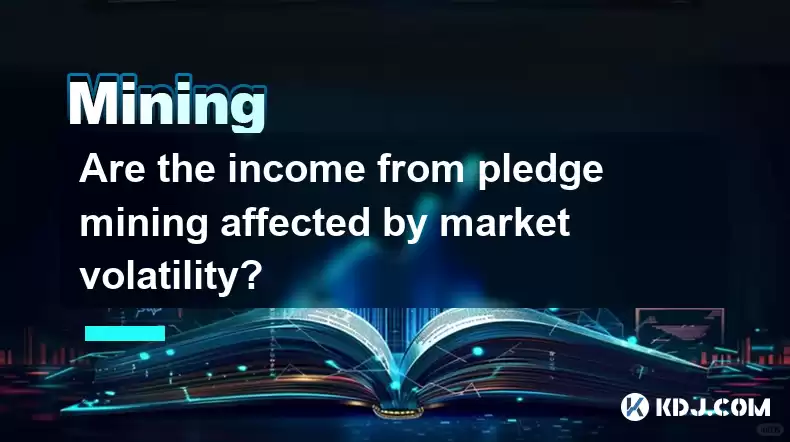
Key Points:
- Staking rewards are not directly tied to the price of the staked cryptocurrency. However, market volatility indirectly impacts staking income.
- Network activity and demand influence staking rewards. High network activity can lead to increased rewards, while low activity may reduce them.
- The value of your staking rewards is directly impacted by the market price of the cryptocurrency. A price drop diminishes the fiat value of your rewards.
- Choosing a reputable staking provider is crucial to mitigate risks associated with market volatility and potential scams.
Are the income from pledge mining affected by market volatility?
The relationship between staking rewards and market volatility is complex. While the amount of cryptocurrency you receive as a reward isn't directly tied to the price fluctuations of that cryptocurrency, the value of those rewards certainly is. Let's break it down.
Staking, often referred to as "proof-of-stake" (PoS) mining, involves locking up your cryptocurrency in a wallet to help secure the blockchain network. In return, you earn rewards in the form of more cryptocurrency. The amount you earn depends on factors like the amount you stake, the network's inflation rate, and the level of competition among stakers.
The core point is this: the number of coins you receive as a reward is largely determined by the protocol's parameters and the network's overall activity. A bull market or a bear market doesn't directly change this reward mechanism. For example, if you're promised 5% annual return staking ETH, you'll still receive 5% regardless of the price of ETH.
However, the value of those rewards is entirely dependent on the market price of the cryptocurrency. If the price of the cryptocurrency drops significantly during the staking period, the fiat value of your accumulated rewards will also drop. Conversely, a price surge will increase the value of your rewards. This means that even though your reward rate is consistent, the worth of that reward fluctuates with the market.
Market volatility can indirectly affect your staking income through its influence on network activity. During bull markets, more users might join the network to stake, increasing competition and potentially slightly reducing individual rewards. Conversely, during bear markets, lower participation might lead to slightly higher individual rewards. This effect is usually minor compared to the direct impact of price changes on the value of rewards.
Another indirect impact comes from the risk associated with market volatility. During periods of high volatility, the risk of significant price drops increases. This risk is magnified if you're staking with a less reputable provider, increasing the chances of losing your staked cryptocurrency due to hacks or scams.
Choosing a reliable and secure staking provider is essential to minimize your exposure to market-related risks. Research the provider's reputation, security measures, and track record thoroughly before committing your funds. Look for transparency and a clear understanding of their fees and reward structures. Diversifying your staking across multiple platforms can also reduce overall risk.
The choice of which cryptocurrency to stake also plays a significant role. Some cryptocurrencies have more stable reward mechanisms than others. The underlying protocol's design and its governance model can influence the consistency and predictability of staking rewards. Understanding the mechanics of the specific cryptocurrency you choose to stake is crucial.
Furthermore, consider the staking method. Some platforms offer delegated staking, where you entrust your coins to a professional validator, potentially leading to higher returns but also introducing additional risk. Others offer self-staking, offering greater control but requiring more technical expertise.
The inflation rate of the cryptocurrency is another key factor affecting your staking income. A higher inflation rate generally translates to higher staking rewards, but this is also affected by market sentiment and adoption. A high inflation rate can sometimes depress the price of the cryptocurrency, counteracting the increase in rewards.
Finally, network upgrades and changes to the protocol can influence staking rewards. These updates can impact the rate of inflation and the overall reward distribution mechanism. Staying informed about any updates to the network you're staking on is essential for managing expectations and mitigating potential negative impacts on your income.
Frequently Asked Questions:
Q: If the price of my staked cryptocurrency drops, do I lose my staked coins?
A: No, you only lose the value of your rewards, not the staked coins themselves, unless the staking provider experiences a security breach or insolvency.
Q: Are staking rewards taxable?
A: Yes, in most jurisdictions, staking rewards are considered taxable income. Consult with a tax professional for specific guidance.
Q: How do I choose a safe staking provider?
A: Research their reputation, security measures, and track record. Look for transparency and reviews from other users.
Q: Can I lose my staked coins due to market volatility?
A: You cannot lose your staked coins due to market volatility unless your chosen staking provider suffers a security breach or insolvency. The value of your coins will fluctuate with the market, but the coins themselves remain yours unless there is a problem with the provider.
Q: Do all cryptocurrencies offer staking?
A: No, only cryptocurrencies that use a Proof-of-Stake (PoS) or similar consensus mechanism offer staking.
Disclaimer:info@kdj.com
The information provided is not trading advice. kdj.com does not assume any responsibility for any investments made based on the information provided in this article. Cryptocurrencies are highly volatile and it is highly recommended that you invest with caution after thorough research!
If you believe that the content used on this website infringes your copyright, please contact us immediately (info@kdj.com) and we will delete it promptly.
- SNEK, Cardano, and the Contributor's Conundrum: A Meme Coin's Fight for Recognition
- 2025-08-08 16:30:12
- Toshi Crypto's Wild Ride: Rally, Demand Slump, and What's Next
- 2025-08-08 16:30:12
- Ethereum, Staking Yields, and DeFi Exposure: A New Era for Investors?
- 2025-08-08 15:10:12
- Unilabs Pumps MIA, Binance Coin Bouncing Back, and Ethereum's Bearish Blues
- 2025-08-08 15:10:12
- Ethereum's Wyckoff Markup and Market Rotation: A New Era?
- 2025-08-08 15:30:12
- Ethereum, Vitalik Buterin, and the Overleveraged Game: A Balancing Act
- 2025-08-08 15:30:12
Related knowledge
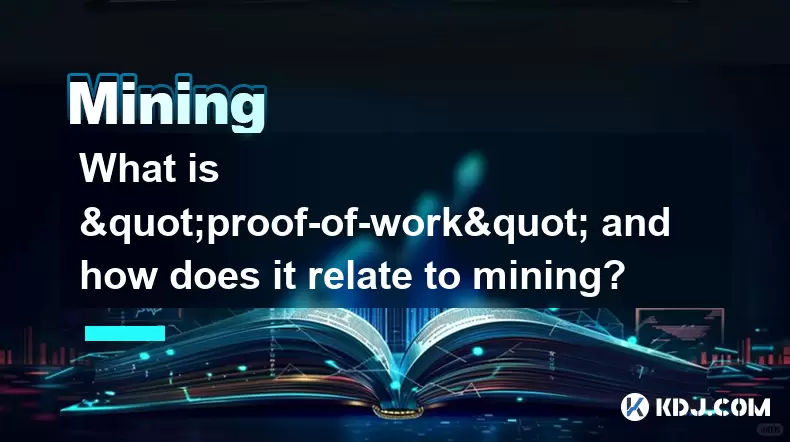
What is "proof-of-work" and how does it relate to mining?
Aug 07,2025 at 02:03pm
Understanding the Concept of Proof-of-WorkProof-of-work (PoW) is a consensus mechanism used in blockchain networks to validate transactions and secure...
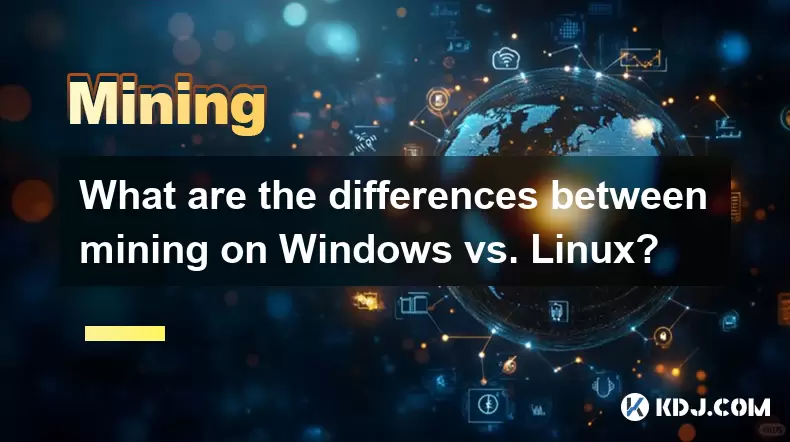
What are the differences between mining on Windows vs. Linux?
Aug 06,2025 at 11:29pm
Overview of Cryptocurrency Mining PlatformsCryptocurrency mining involves using computational power to solve complex cryptographic puzzles and validat...
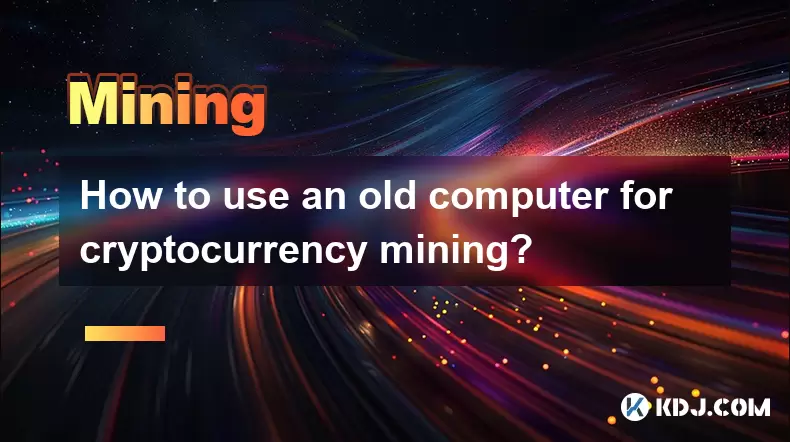
How to use an old computer for cryptocurrency mining?
Aug 07,2025 at 12:42pm
Understanding the Feasibility of Using an Old Computer for MiningUsing an old computer for cryptocurrency mining may seem outdated, but it is still te...

Can you mine cryptocurrency using solar power?
Aug 07,2025 at 12:00am
Understanding the Basics of Cryptocurrency MiningCryptocurrency mining involves validating transactions on a blockchain network by solving complex cry...
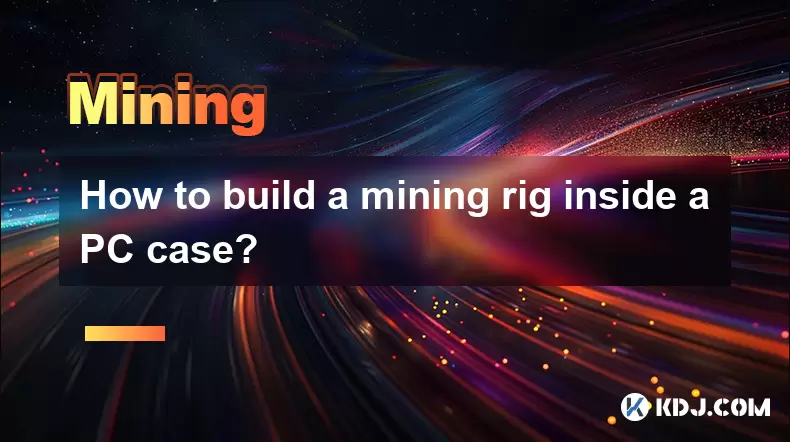
How to build a mining rig inside a PC case?
Aug 06,2025 at 11:01pm
Understanding the Basics of a Mining Rig in a PC CaseBuilding a mining rig inside a PC case involves transforming a standard computer chassis into a d...

What are the best cryptocurrencies to mine with an ASIC?
Aug 08,2025 at 01:22am
Understanding ASIC Mining and Its Role in CryptocurrencyASIC stands for Application-Specific Integrated Circuit, a specialized hardware designed to pe...

What is "proof-of-work" and how does it relate to mining?
Aug 07,2025 at 02:03pm
Understanding the Concept of Proof-of-WorkProof-of-work (PoW) is a consensus mechanism used in blockchain networks to validate transactions and secure...

What are the differences between mining on Windows vs. Linux?
Aug 06,2025 at 11:29pm
Overview of Cryptocurrency Mining PlatformsCryptocurrency mining involves using computational power to solve complex cryptographic puzzles and validat...

How to use an old computer for cryptocurrency mining?
Aug 07,2025 at 12:42pm
Understanding the Feasibility of Using an Old Computer for MiningUsing an old computer for cryptocurrency mining may seem outdated, but it is still te...

Can you mine cryptocurrency using solar power?
Aug 07,2025 at 12:00am
Understanding the Basics of Cryptocurrency MiningCryptocurrency mining involves validating transactions on a blockchain network by solving complex cry...

How to build a mining rig inside a PC case?
Aug 06,2025 at 11:01pm
Understanding the Basics of a Mining Rig in a PC CaseBuilding a mining rig inside a PC case involves transforming a standard computer chassis into a d...

What are the best cryptocurrencies to mine with an ASIC?
Aug 08,2025 at 01:22am
Understanding ASIC Mining and Its Role in CryptocurrencyASIC stands for Application-Specific Integrated Circuit, a specialized hardware designed to pe...
See all articles

























































































